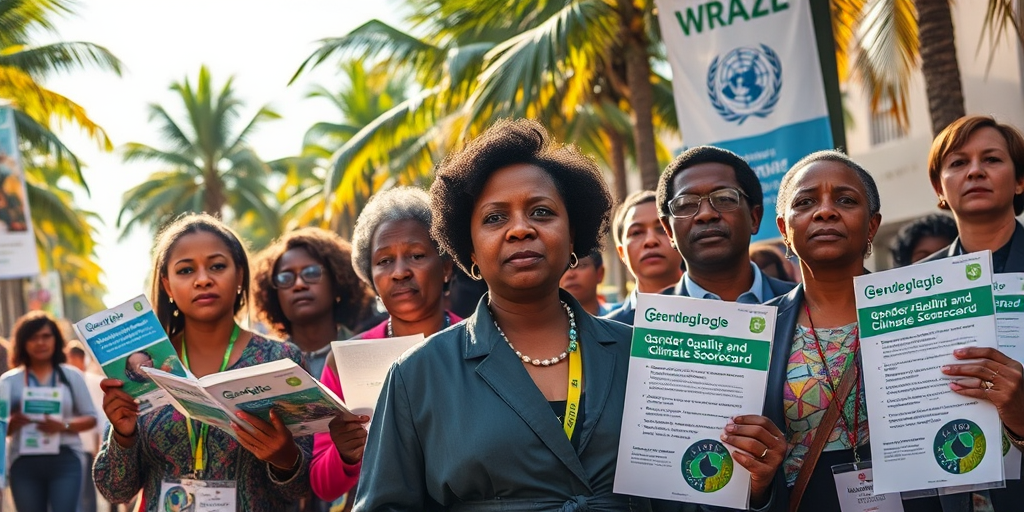UN Women Pushes for Stronger Gender Action Plan at COP30 Amid Growing Climate Challenges
As world leaders convene in Belém, Brazil for the 30th Conference of the Parties (COP30) to the United Nations Framework Convention on Climate Change (UNFCCC), UN Women has issued a powerful call for the adoption of a fortified Gender Action Plan (GAP). This call underscores the critical necessity for maintaining gender equality as a central pillar of climate action strategies globally.
This Year’s COP: A Pivotal Moment for Policy
COP30 arrives at a crucial juncture, poised to influence climate policies for the next decade. UN Women warns that neglecting gender considerations in climate processes could detrimentally affect efforts towards achieving equitable and sustainable outcomes. As the conference progresses, the emphasis is firmly on ensuring that the new GAP addresses the challenges faced by women and marginalized communities.
Sarah Hendriks, Director at UN Women, articulated the stakes involved: “Failure to adopt a robust GAP would set back gender equality and human rights, undermining hard-won progress and signaling that women’s leadership and experience are expendable in the climate fight.”
The Gender Action Plan: Historical Context and Future Aspirations
The roots of GAP date back to 2017, marking its role as instrumental in embedding gender perspectives across various facets of the UNFCCC process — from mitigation and adaptation to finance and capacity-building. Its evolution reflects a growing awareness that gender equality is not ancillary to climate policies but foundational to their success.
UN Women advocates for a transformative GAP that is adequately funded and entrenched in accountability measures, focusing on dismantling the structural causes of gender inequality, protecting women’s rights, and acknowledging women, especially those defending environmental human rights.
Scorecard Findings: A Mixed Global Commitment
The opening of COP30 also heralded the launch of the Gender Equality and Climate Policy Scorecard by UN Women and the Kaschak Institute for Social Justice for Women and Girls. This tool provides a detailed analysis of national climate policies, assessing how governments integrate gender considerations into their frameworks.
Findings from the initial assessment indicate a disparity among nations. While some countries exhibit comprehensive policies addressing gender disparities, others show minimal engagement. Most notably, economic security is a top concern, yet areas like women’s health and unpaid care work are comparatively neglected.
The implications for the United States and local communities, including residents in the Rio Grande Valley (RGV), are profound. Despite the recognition of women’s vulnerabilities to climate change, there remains a gap in leveraging women as active contributors to climate solutions, an opportunity vital for regions like the RGV that already experience climate-related challenges.
Community Impact and Voices from the RGV
Local advocates in the RGV are monitoring COP30 developments with keen interest. Amanda Rodriguez, the director of an environmental justice organization in McAllen, Texas, emphasized, “For communities in the Valley, climate change and gender equity are interconnected issues. This is about ensuring our policies reflect the experiences and needs of diverse populations.”
Residents and community leaders are hopeful that international commitments will translate into local action. The policy changes could enhance economic resilience by encouraging the active participation of women in climate-smart agriculture and renewable energy projects, areas where the RGV has potential for impactful growth.
Path Forward
A successful outcome at COP30 might set a precedent that reinforces inclusive decision-making within climate governance structures. This is essential not only as a means of addressing existing inequalities but also of fostering innovative and effective solutions to the multifaceted climate challenges.
UN Women’s advocacy seeks not only to influence policy at an international level, but also to inspire local changes that reflect these commitments. The potential for collaboration between national policies and grassroots initiatives is immense, with a focus on empowering Indigenous and rural women being particularly underscored as crucial.
Moving Towards Gender-Responsive Action
The next steps involve engaging stakeholders from all sectors, ensuring continued dialogue, and developing actionable plans that incorporate the various dimensions of the Gender Equality and Climate Policy Scorecard. For local organizations and residents eager to contribute to this change, resources and engagement forums will be key to effective implementation.
In conclusion, COP30 represents not just another conference, but a call to action with international and local implications. The RGV, like many other communities, stands at a crossroads where robust gender-responsive climate policies can pave the way for sustainable development and empowerment, championing a future where equality and environmental stewardship go hand in hand.







